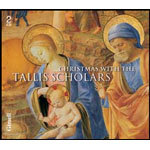
Christmas with the Tallis Scholars
 $32.00
Out of Stock
$32.00
Out of Stock6+ weeks add to cart
CLEMENS non PAPA / PRAETORIUS / TALLIS / VICTORIA / etc
Christmas with the Tallis Scholars
Tallis Scholars
[ Gimell / 2 CD ]
Release Date: Thursday 18 March 2004
This item is currently out of stock. It may take 6 or more weeks to obtain from when you place your order as this is a specialist product.
"I am delighted to recommend this seasonal selection. Over the years we have recorded many different types of Christmas music - carols, chants, chorales, hymns and masses - but this is the first time they have been put together in one collection." Peter Phillips
Every choral group knows what it is to plan a Christmas programme. The Tallis Scholars are no exception, with the difference that every year for the last fifteen we have kept going back to the same places in the United States for Christmas concerts, and, not wishing to repeat ourselves, have slowly put together a substantial repertory of appropriate music: substantial and diverse, including medieval carols, German chorale harmonisations, complete polyphonic settings of the Mass based on Christmas themes, and motets dedicated to Mary and Joseph. Some of these riches we eventually recorded, originally on four separate releases. These two discs give a selection.
The first disc is taken from our Christmas Carols and Motets recording, which was designed to show off the medieval carol alongside more polyphonic music. The carols are all of English provenance, culminating in two settings of the Coventry Carol. In general the carol was a form of popular music, retaining an unsophisticated manner and for many centuries transmitted by oral tradition only. There are carols on just about every subject of concern to people living in those past centuries, including drinking and fighting; but the majority refer to religious topics, and of these Christmas is the most represented. Many carols include a refrain, which presumably was sung by everybody standing round, while the verse was performed by the person who came up with the idea in the first place. The refrain would have been sung after each verse, as may be heard here in Nowell sing we, There is no rose and Lullay: I saw which, like every Coventry Carol, has 'lully, lulla' as its refrain. Angelus ad virginem, by contrast, is not of popular origin, being in Latin and based on plainchant.
Many Renaissance composers set the beautiful words 'Ave Maria' ('Hail Mary'), so central to the Christian faith. One of the earliest is the four-part version by Josquin des Prés, famous for its simplicity of expression. The same simplicity and clarity of part-writing characterizes the linked seven-part settings of Beata es virgo and Ave Maria by Philippe Verdelot, in which the second soprano part carries the 'Ave Maria' chant throughout. By contrast the two settings by Victoria (of which the four-part is only attributed to him) include wide variations of texture and rhythm, especially noticeable in his highly expressive eight-voice version.
The well known repertoire of German Christmas melodies evolved rather later than the English medieval carol. All these melodies are taken from chorales, most of which were written after the Reformation in the sixteenth century, though it is possible that some of them, like In dulci jubilo, go back further into oral tradition. They underwent many harmonisations and arrangements over the years, as Lutheran musicians thought fit, though few can rival in sensitivity those given here. Michael and Hieronymus Praetorius, who were not related, were both working in Germany at the turn of the seventeenth century.
"Heavenly simplicity, and more intoxicating than most things you'll be offered over the holiday season." BBC Music Magazine
Tracks:
Anonymous:
Angelus ad virginem
Nowell sing we
There is no rose
Lullay: I saw (The Coventry Carol)
Lully, lulla thou little tiny child (The Coventry Carol)
Plainchant:
Missa in gallicantu
Plainchant:
Christe Redemptor omnium
Plainchant:
Veni, Redemptor gentium
Plainchant:
Salvator mundi, Domine
Plainchant:
A solis ortus cardine
Clemens Non Papa:
Pastores quidnam vidistis
Missa Pastores quidnam vidistis
Josquin des Prés:
Ave Maria 4 vv
Praetorius:
Es ist ein' Ros' entsprungen
Joseph lieber, Joseph mein
In dulci jubilo
Tallis:
Missa Puer natus est nobis
Verdelot:
Beata es Virgo/Ave Maria 7 vv
Victoria:
Ave Maria 4 vv
Ave Maria (double choir)



